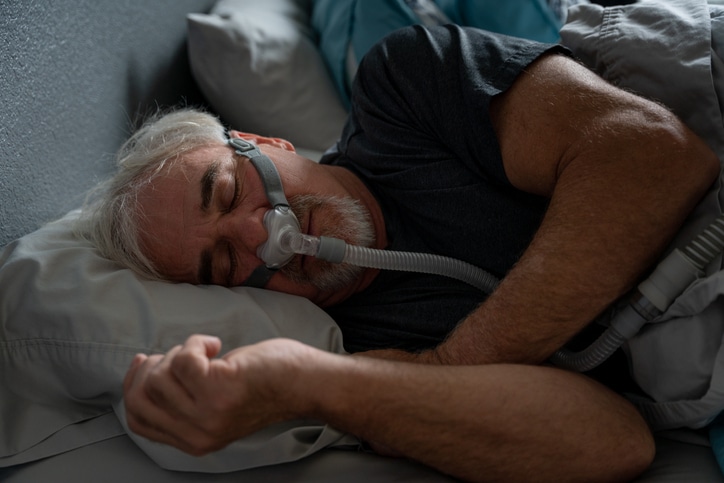Weight loss may be the primary motivation for bariatric surgery, but it’s only the beginning of the potentially life-changing health benefits.
From diabetes to heart disease, there are a host of chronic conditions that weight-loss surgery can help correct — and these metabolic effects often show up long before a patient sheds a pound.
“Blood pressure, sleep apnea, and high cholesterol are all resolved faster than the weight loss,” says Aaron B. Hoffman, MD, FACS, bariatric surgeon on the medical staff at Methodist Dallas Medical Center. “Although the weight takes a little time to come off after the surgery, the metabolic effects start right away.”
Here are six additional benefits of weight-loss surgery:

1. IMPROVING HEART HEALTH
Being overweight or obese can cause heart disease and other cardiovascular conditions such as hypertension, dyslipidemia, and inflammation.
A 2021 study found that bariatric surgery patients with obesity and cardiovascular disease experienced 38% fewer cardiovascular events than those with similar conditions who didn’t have the surgery.
“For patients that already have established heart disease or had a heart attack or stroke, the surgeon and the patient need to understand the risks and benefits of undertaking any surgery,” Dr. Hoffman says. “However, in most cases, patients do better and the literature supports the intervention to extend their life.”
In many cases, blood pressure and cholesterol levels return to normal shortly after surgery, and the weight loss reduces a patient’s risk of coronary and peripheral heart disease, while preventing death from stroke and heart attack.

2. RESOLVING TYPE 2 DIABETES
For those with type 2 diabetes, weight-loss surgery presents the opportunity for long-term remission. Patients in remission can live insulin-free for at least three years after surgery.
“If a patient is fortunate enough to have the type 2 diabetes resolved after surgery, it’s important that they lead a healthy lifestyle, maintain a low glycemic diet, and exercise with the weight loss,” Dr. Hoffman says.

3. RELIEVING DEPRESSION
While the physical effects of weight-loss surgery are well-known, the psychological implications often are overlooked. Obesity is often associated with sadness and anxiety, with 43% of obese adults struggling with depression.
A 2015 study found that one in three patients experienced a decrease in depression at the time of surgery, while one in six felt less depressed six to 12 months post-surgery.
“Many patients report improved happiness and self-esteem with the ability to simply do things they haven’t been able to do in a long time, like tie their shoes or play with their grandchildren,” Dr. Hoffman says.
Dr. Hoffman says bariatric surgery can even eliminate the need for anti-depression medications.

4. ELIMINATING SLEEP APNEA
The risks of developing sleep apnea are much higher for patients with obesity because excess body fat interferes with breathing. The effects include reducing the size of the airway, lowering lung capacity, and making the throat more likely to collapse while a person sleeps.
“Prior to bariatric surgery, we screen patients for sleep apnea, which can affect stress levels and quality of sleep,” Dr. Hoffman says.
After weight-loss surgery, some patients no longer need their CPAP machines, the continuous positive airway pressure devices that keep breathing airways open while they sleep.
“If we can improve the sleep apnea by decreasing the thickness of the patient’s neck with weight loss, and the tissues inside their throat, patients can not only come off the nighttime breathing machines but have a better quality sleep,” Dr. Hoffman says.

5. IMPROVING FERTILITY
More than 80% of bariatric patients are women, and above half are in their reproductive years. Weight loss can improve fertility and protect women and their babies from obesity-related risks during pregnancy, such as:
- Preeclampsia
- Gestational diabetes
- Premature birth
- Stillbirth
- Need for C-section delivery
“Women who have struggled to become pregnant become very fertile after weight-loss surgery because their hormones become more supportive for sexual health,” says Dr. Hoffman. “Patients with PCOS, polycystic ovarian syndrome, find that the condition improves as well.”

6. ALLEVIATING ARTHRITIS
For patients with arthritis, shedding excess weight reduces joint pain and other arthritis-related symptoms.
Osteoarthritis occurs when repetitive motion damages tendons, ligaments, and the cartilage that connects and pads the ends of our bones. And when there’s extra weight on those joints, that damage is compounded.
But that’s just one way extra weight contributes to arthritis. Because fat is chemically active, it’s constantly releasing proteins that inflame other tissue. In short, gaining weight can cause inflammation that spreads to other parts of the body, including the hands.
What’s more, losing weight after surgery helps patients improve their mobility, enabling them to exercise to maintain and manage their weight loss.

SUPPORT AFTER SURGERY
Just as the health benefits don’t end with weight loss, the care and support patients receive does not end after the surgery is over.
“We’re there for you long term, and make sure that you’re successful,” says Dr. Hoffman, noting the importance the bariatric team at Methodist Dallas puts on follow-up appointments.
And there’s another benefit Dr. Hoffman cites in the time and money saved for patients who can shed chronic conditions and medications — along with the weight they lose.
“The overall quality of life improves where patients spend less time at the doctor’s office and take fewer medications which can provide long-term cost savings,” he says.






